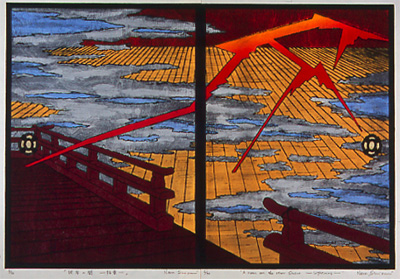The second Japan Water conference event centred on the theme of power. We looked at water’s raw kinetic potential, its exploitation as a political pawn and its relevance for communities. The purpose of this event was to discuss the subject from different perspectives from art, science and politics – and above all, the environment.
The event featured a panel of speakers from a range of different subjects and disciplines, providing their varying perspectives.
An on-line event, Friday 25 June, 2-4pm BST.
The Keynote
The Keynote speaker is Veronica Strang, Professor at the University of Durham, and author of many books including ‘The Meaning of Water’ (Berg 2004).
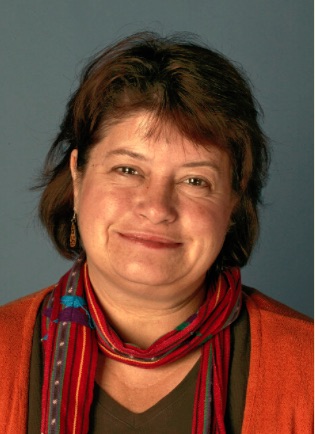
For the last 30 years Professor Strang’s research and consultancy work has been concerned with human-environmental relationships, in particular societies’ engagements with water. Every society has pressing water issues, so this has taken her all over the world, but her major ethnographic research has been in the UK, Australia and New Zealand. She has worked with the water industry and multiple water using groups including indigenous people, farmers, miners, urban and recreational water users, conservation organisations, museums and artists.
Speakers include:
Hakan Topal (exhibiting artist)

Hakan Topal will discuss artistic responses to disasters. Having experienced and researched a series of ‘natural’ water disasters, from his native Turkey, to New Orleans to Japan, he can speak from both personal and theoretical perspectives. He will refer to these, as well as his residency work in Miyagi Prefecture following the Fukushima tsunami, earthquake and nuclear power disasters
Jonathan Meuli (exhibiting artist)
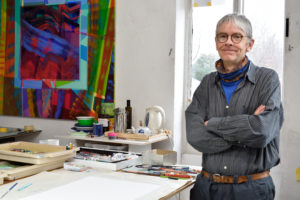
Jonathan Meuli will discuss the power of the wave, both as artistic inspiration and as a force capable of both cultural and geographical transformation.
Makoto Takahashi (Public Science Research, Technical University of Munich),

Makoto’s core interests lie in how societies come to understand technological risks and how they decide who can credibly inform policy. His thesis for the Univeristy of Cambridge, examined how expert authority is claimed and contested in conditions of low public trust. This project drew upon extensive ethnographic fieldwork, conducted in Japan following the 2011 Fukushima Daiichi nuclear power plant disaster.
Simon Kaner (Archaeologist and Director Sainsbury Institute for Study of Japanese Arts and Cultures)
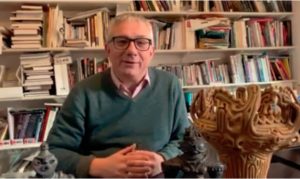
Simon Kaner will discuss the impact of the Fukushima disaster on archaeology and heritage.
Jack Heslop, (WSP, engineer and specialist in water power),

Jack Heslop has been working with a number of local authorities and agencies on flood risk strategies for the SW in England. He will discuss the impact of flooding in different regions; water as a force and how this creates different threats and varied responses depending on the contexts
Adrian Favell (Chair of sociology & social theory, University of Leeds)
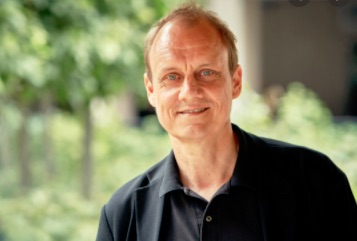
Adrian Favell will consider the impact of the Fukushima disaster in Japan on artists, especially looking at socially engaged art.
Marie Whaley (International Water Association)
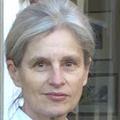
Marie Whaley will consider working in partnership and collaborating internationally to achieve common objectives
Professor Kumi Kato (Wakayama University)
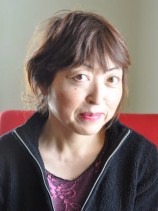
Kumi Kato is Professor of Environmental Studies in Wakayama University Tourism Studies and at a Buddhist university in Tokyo. She taught at the University of Queensland in Australia for 24 years. She installed traditional Japanese water harps deep in Tasmanian forests. She has written on sound environments, sense of place, intangible cultural heritage and the ama women divers of Japan. Currently she is supporting the artistic cultivations of farmers, dancers, blacksmiths, painters, and fishermen in and around Fukushima, Japan, as well as collaborating with the spiritual and municipal leaders at the UNESCO World Heritage Site that includes Nachi Waterfall, the tallest and most auspicious in Japan, if not the entire world. She holds the prized Dual Pilgrim Credential for Kumano Kodo Japan and the Camino del Santiago.
The outline programme
Order of speakers & outline timings 25 June
2.00 Introduction
2.05 Veronica Strang – Power Relations in Human Engagements With Water.
2.25 Hakan Topal – natural disasters and artists
2.45 Makoto Takahashi – communities, politics and water disasters
3.05 5 min discussion
3.10 Simon Kaner – Fukushima and heritage
3.30 Marie Whaley – international water association
3.50 5 min discussion
3.55 10 min break
4.05 Jack Heslop – the engineering of water power
4.25 Jonathan Meuli – imagining the power of water
4.45 5 min discussion
4.50 Adrian Favell – Fukushima and artistic responses
5.10 Kumi Kato – artistic responses to water in Japan
5.30 30 minute discussion / questions
6.00 Finish
Briefing notes
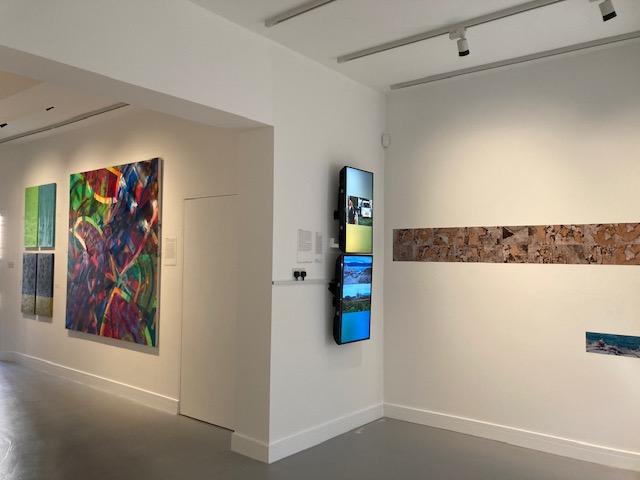
Some of our themes:
The effects of Japan’s terrible water disasters on 2011, the tsunami and the nuclear spillage at Fukushima are still being felt. Natural disasters: Earthquakes and Tsunamis, potentially the most volatile and destructive of natural disasters are uncontrollable. They often leave nothing but devastation in their wake. Understanding the extent to which these natural catastrophes affect all sectors of society, from the life of the individual to the global economy itself, is essential to implementing proactive measures to ensure the safety of people and environment.
Water as a force in climate change.
Political and policy consequences of water disasters for regions and communities.
Water as a pawn in diplomacy.
Water commodification and its exploitation.
Water Commodification: Hakan Topal an activist, artist and professor discusses how the construction of dams by the Turkish government to control water flow to Iraq and Syria is, in reality, a diplomatic move.
Acid rain: Isao, a featured artist of the exhibition, grew up working in the Northern rice paddies of Japan and has considerable knowledge regarding the pollution from mainland China and Taiwan that carries over and corrupts the crops of Japanese fields through acid rain.
Overfishing: International waters are fair game to South Asian fisheries, who are actively destroying the rich biodiverse aquatic ecosystems of the Indian and Pacific ocean. In addition, recent research shows that the Mediterranean sea is exceedingly vulnerable to collapse.
The effect of water disasters on the environment.
Natural disasters: Earthquakes and Tsunamis, potentially the most volatile and destructive of natural disasters are uncontrollable, often leaving nothing but devastation in their wake. Understanding the extent to which these natural catastrophes affect all sectors of society, from the life of the individual to the global economy itself, is essential to implementing proactive measures to ensure the safety of the people.
Nuclear contamination: Nuclear radiation has disastrous consequences when leaking into bodies of water. This creates thermal pollution and, in cases of human consumption, can severely damage internal tissue
The impact of water power on heritage.
How water behaves?
– the expectations in different locations for how its power may be anticipated and controlled.
Water supply
The issue of maintaining pure sources or bodies of water has become a growing concern. Discussing the threats and possible solutions to preserving the water supply of communities will surely be the issue that hits closest to home.
The environment
Where the environment is concerned we have to think globally. The lessons from this exhibition will be a starting point for us to discuss parallel issues locally and more widely.
Speakers will discuss implications for the environment both in the UK and for Japan and other parts of the world.
Art can lead us to a realm of discussion through the ideas it raises, but the discussion can roam into a wider field. The whole point will be to discuss the environment as a result.
The wave
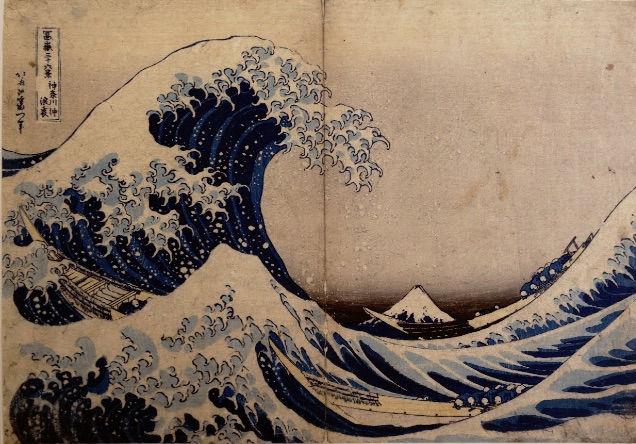
The wave is an iconic image in Japanese art and culture. As we have learned through the great early 19th-century Japanese artist Hokusai, it is an image for the world too. Hokusai’s The Great Wave off Kanagawa (1829-1833), one of his 36 Views of Mount Fuji series, is world famous. It makes its appearance in so many contexts. Every artist in the exhibition owes a debt to this work in particular.
Bookings and enquiries
You can book via Eventbrite here https://www.eventbrite.co.uk/e/the-power-of-water-tickets-152738564157
Also for bookings and further enquiries send a message to mail@groundworkgallery.com

